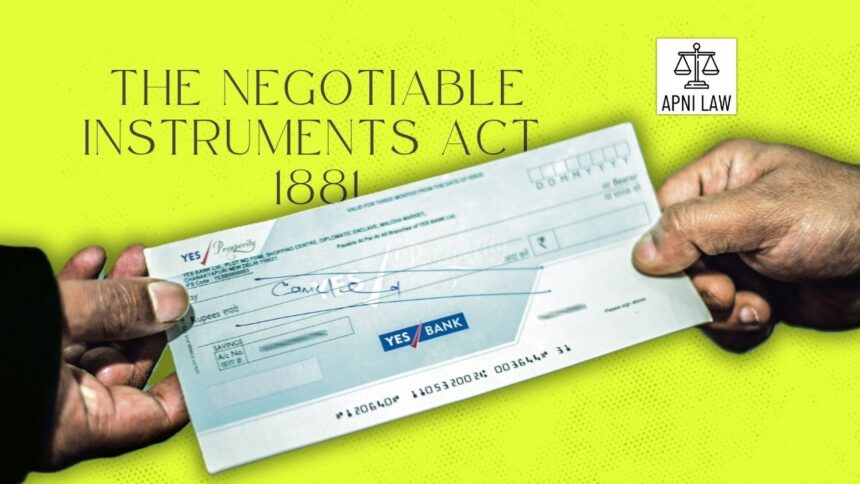Introduction
The Negotiable Instruments Act, 1881 is a key law in India that regulates the use and legal validity of promissory notes, bills of exchange, and cheques. It defines their features, methods of transfer, and enforcement mechanisms. The Act creates a legal foundation for smooth financial transactions in commercial and banking systems.
What Is a Negotiable Instrument?
A negotiable instrument is a written document that promises or orders the payment of a fixed amount of money. It is easily transferable from one person to another. Section 13 of the Act identifies promissory notes, bills of exchange, and cheques as negotiable instruments. These instruments can be transferred by delivery or by endorsement and delivery, depending on their form.
What Are The Types of Negotiable Instruments
The Act focuses on three main instruments:
A promissory note is a written promise to pay a certain amount to a specified person.
A bill of exchange is a written order from one person to another to pay a certain amount to a third party.
A cheque is a specific type of bill of exchange drawn on a bank and payable on demand.
Each instrument plays a vital role in facilitating secure and reliable monetary transactions.
What Are The Features of Negotiable Instruments
Negotiable instruments are freely transferable, which makes them essential in trade and commerce. A person who obtains an instrument in good faith, for value, and without knowledge of prior defects is known as a holder in due course. This holder gets special protection under the law. The Act also provides legal presumptions to support enforcement, including assumptions of consideration, proper endorsement, and execution.
What Are The Legal Rights of a Transferee or Holder in Due Course
The Act gives robust protection to the transferee, especially if they are a holder in due course. Such a person receives a clean title even if previous holders had a defective one. They can sue in their own name without notifying the original debtor.
Modes of Negotiation and Transfer
The law recognizes two main modes of transfer:
Delivery only: If the instrument is payable to the bearer, it can be transferred simply by delivering it.
Endorsement and delivery: If it is payable to order, it must be endorsed and physically delivered to transfer rights.
What Is Legal Presumption Under Sections 118 and 119
Sections 118 and 119 of the Act provide strong legal presumptions that work in favor of the holder. These include assumptions about valid consideration, date, order of endorsements, and more. These presumptions remain valid unless disproved, which eases the process of claiming rights under the instrument.
What Is Cheque Bounce and Section 138
Section 138 of the Act deals with the dishonour of cheques due to insufficient funds. Introduced through the 1988 amendment, this provision made cheque bounce a criminal offence. It empowers the payee to take legal action and ensures that cheques remain a trustworthy mode of payment in India.
Amendments to the Act
The 1988 amendment introduced criminal liability for dishonoured cheques to build confidence in cheque-based transactions. The 2018 amendment focused on improving the efficiency and speed of cheque bounce case resolutions. These changes reflect the law’s adaptability to India’s evolving financial ecosystem.
Is There A Requirement for Notice of Transfer
A transferee is not required to inform the party liable to pay about the transfer of the negotiable instrument. This simplifies the legal process and ensures ease of enforcement for the holder. The Act recognizes the autonomous rights of the transferee or holder in due course.
Conclusion
The Negotiable Instruments Act, 1881 plays a critical role in regulating India’s financial instruments. It ensures smooth transactions by providing a secure legal framework for the transfer and enforcement of promissory notes, bills of exchange, and cheques. With strong protections for the holder and efficient legal remedies, the Act continues to be a backbone of commercial and banking law in India.







